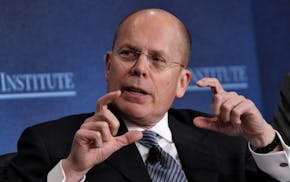Are you feeling burned out? Maybe you are more exhausted than usual or less motivated.
Burnout is a catchphrase for cumulative work- and life-related stress — and it has a long history.
The symptoms were understood by Greek physicians Hippocrates and Galen. The diagnosis appears in medieval theology as acedia, defined as "a listless indifference to worldly life brought about by spiritual exhaustion," writes psychoanalyst Josh Cohen for the Economist.
Burnout is getting attention these days from the toll taken on our mental and physical health during the upheavals of recent years. (Think pandemic.)
I took notes on burnout while sitting in the sold-out Southern Theater in Minneapolis, enjoying a terrific two-person musical several months ago. The musical "How to Avoid Burnout in 73 Minutes" is written and performed by Dr. Stuart Bloom, a Twin Cities oncologist.
A former New York stand-up comi, Bloom had experienced burnout, researched burnout and wrote a humorous musical about burnout.
The musical focuses on physician burnout. Yet the concern about burnout holds true for other careers.
Burnout also raises alarms about the risk of managing our money poorly.
It's hard enough to find the time and energy to manage our money, including retirement savings plans and estate planning. Now add feeling constantly exhausted and worried that you're failing everyone at work and at home.
The risk is one reason why it pays to automate personal finances for good and bad times, including target-date funds for retirement and automatic deposits into savings.
"Why does my financial adviser care about this?" asks Laura Amico in a Harvard Business Review article, "My Burnout Isn't Just a Health Issue. It's a Money Issue."
"Because, he explained, even though I'm on track to meet my retirement goals today, if I burn out to the point where I can't do my job, I'm putting the financial safety net I've worked so carefully to construct at risk."
Burnout also often reflects "moral injury," an evocative phrase for the stress that comes from working hard in a career and job you love yet your values conflict with the way your workplace is run.
Bloom told a powerful story in his musical about rediscovering connection and purpose in a moment of humor at his expense by a patient.
Personal finance is nothing more than a set of tactics to support a life that reflects your values. The signs of burnout are a blaring alarm to take stock and rediscover your purpose.
Chris Farrell is senior economics contributor, "Marketplace"; commentator, Minnesota Public Radio.

UnitedHealth sues the Guardian, alleging defamation in coverage of nursing home care

Prices for international flights drop as major airlines navigate choppy economic climate
Minnesota's med spa industry rises in popularity — and with little regulation

Hundreds line up at Best Buy to nab Nintendo Switch 2, in scene like '90s opening parties

